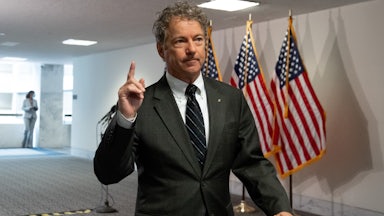Even though we are 11 months away from next November, there’s no mystery about what the Republican Party’s message will be in the forthcoming midterm elections. Opposition to “critical race theory” helped win the party Virginia’s gubernatorial race—something many previously thought was impossible, given the state’s rapid suburbanization—and is already cropping up in early advertisements and talking point memos. Endless droning about the economy, inflation, and the price of gas will be on the table, regardless of whether all three are in better shape next fall than they are at the moment.
But beyond that? Don’t expect much—or anything. Last week, Axios reported that Mitch McConnell “has told colleagues and donors Senate Republicans won’t release a legislative agenda before next year’s midterms.” Asked by one donor if the party would have a message beyond “We all know what’s wrong with the Democrats,” McConnell responded with “something to the effect of, with all respect, that’s not what we’re doing,” per one source.
This isn’t exactly new. McConnell retook the Senate with a similar ploy in 2014, an election in which Republican hopefuls offered no agenda beyond continued obstruction—a strategy that paid dividends when he successfully prevented Barack Obama from appointing a replacement for Antonin Scalia on the Supreme Court just over a year later. Now McConnell’s optimal outcome is more of the same: Retake one or both chambers of Congress, grind the gears of governance to a halt, and then ride a wave of discontent with all the nothing that’s getting done to a Republican presidency—and, likely, a trifecta—in 2024.
But it’s not just nostalgia for past electoral successes that’s driving the strategy. It’s also a reminder of how deeply unpopular the Republican legislative agenda is—to the extent that it exists at all. McConnell and other Republicans are running on half-baked hot-button cultural issues because that’s all that they have to offer. As Corry Bliss, a longtime staffer to Ohio Senator Rob Portman, told the National Journal last year, “If you want to spend all your time going on Fox and be[ing] an asshole, there’s never been a better time to serve. But if you want to spend all your time being thoughtful and getting shit done, there’s never been a worse time to serve.” (True to form, Portman announced his retirement last January.)
What few policy ideas Republicans do have are mostly deeply unpopular. The signature legislative accomplishment of the Republican Party during the Trump era was a massive upward redistribution of wealth: a gigantic tax cut for corporations and the wealthy. Two years after that bill was signed into law, Gallup found that only 40 percent of voters approved of it. The effort to repeal and replace Obamacare, though thwarted, was also deeply unpopular. On issues like trade and immigration, Donald Trump proved to be King Midas in reverse: Both became more popular during his presidency. For the last several decades, the GOP has been united around the idea of fiscal responsibility—particularly of cutting social welfare programs and spending. And yet while Republican politicians have half-heartedly attacked the Biden administration’s spending programs, it’s clear that austerity measures won’t be part of the party’s midterm agenda—though austerity will almost certainly be the norm should it retake the presidency.
This explains, partly, why Republicans have focused so heavily on flashy but insubstantial cultural issues, from “cancel culture” to Dr. Seuss books being “banned.” These issues definitely motivate Republican voters, but there’s also an element of sleight of hand at play. Cancel culture is not something that can be defeated; efforts to halt critical race theory at the state level have mostly resulted in bills banning books that refer to slavery, genocide, and other historical ills. They’re reliably red meat–flavored, but from a policy perspective they’re an Impossible Burger, given that there is no real way for the party to actually defeat these ideas. Besides, defeating them is not the point: These bogeymen are only useful if you can keep them salient as issues far into the political horizon.
At the state level, there are more troubling clues about GOP priorities. Republican legislatures have gone to extraordinary lengths, citing Donald Trump’s fake allegations of massive voter fraud in the 2020 election, to take control of the electoral process and to put in place policies that would make it harder for Democrats to win and place near the levers of power a coterie of true believers who will happily snatch and grab the election should Democrats get lucky. They have also made a series of moves to block mask and vaccine mandates that would help to halt the Covid-19 pandemic.
What ties these issues together is that they’re nearly all, as New York’s Eric Levitz noted earlier this year, “either devoid of policy substance or purely reactive.” The Biden administration issues a vaccine mandate for large employers; Republicans oppose it. There is a sense that many of the Republican Party faithful spend their days looking for obscure cultural stories to drum up resentment and engagement on the right, whether they be about New York Times journalists or Oberlin College students or Toni Morrison novels.
But you can’t stitch together this Frankenstein’s monster of culture-war bric-a-brac into anything that could even be mistaken as a legislative agenda that might provide a broadly shared prosperity. McConnell understands full well that talking out loud about the few ideas that Republicans still cherish is a mistake politically. As my colleague Matt Ford has pointed out, to the extent that McConnell talks about a “Republican agenda” at all, he depicts it as something the Republicans would unleash if the Democrats got rid of the filibuster: “As soon as Republicans wound up back in the saddle,” he has said, “we wouldn’t just erase every liberal change that hurt the country. We’d strengthen America with all kinds of conservative policies with zero input from the other side.”
Naturally, if “all kinds of conservative policies” were popular, he’d just abolish the filibuster and implement them himself. But since he seems to be implying that this would not benefit the GOP politically, the best bet is to do what the party has been doing for the past year: turning Mr. Potato Head and Dr. Seuss into a political message, retaking the House (if not the Senate), and then doing everything possible to stop the Biden administration from getting anything done. It’s worked before; it just might work again.










